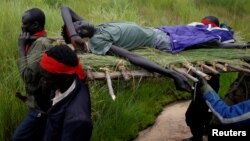Members of South Sudan's many warring factions are gathered at a forum in the hope of working out a cease-fire as soon as Friday.
More than 100 members of various groups are attending talks in Addis Ababa, sponsored by Intergovernmental Authority on Development, that are aimed at revitalizing a 2015 peace deal.
Representatives of both armed and unarmed groups met Tuesday at the African Union headquarters in Addis Ababa to discuss a draft permanent cease-fire.
Civil society groups at the forum said the warring parties should first silence their guns. Clashes between government forces and rebel fighters loyal to Riek Machar were still being reported Tuesday in Lasu, Kajo Keji in Yei River state and Lol state.
Edmond Yakani of the Community Empowerment Network told South Sudan in Focus that warring parties were positioning themselves to gain territory on the ground before signing a cease-fire.
"We are heading to dry season," when fighting typically flares up. "And that is why we called for the armed groups, for the sake of the lives of the citizens of South Sudan," to stop fighting for at least a week, Yakani said.
Rebecca Nyandeng, widow of South Sudan's founding father, John Garang, said at the forum that President Salva Kiir's ineffective government should be replaced.
How many must die?
"If you are afraid to say it, I am saying it, because there is nothing they are delivering," she said. "Three weeks ago, hundreds of people died. How many people do we need to die in order for us to see this government [is] not delivering?
"The way forward is for the government in Juba to go, because there is nothing that they can deliver and they will never change. Dr. John used to say the government in Khartoum is too deformed to be reformed. It is this government in Juba who is too deformed to be reformed.''
South Sudanese gender activist Rita Lopidia told South Sudan in Focus the fighting has taken a heavy toll on women and girls.
"The suffering of the women and girls in the republic of South Sudan has surpassed all levels of carnage," she said. "The massive displacement, the deteriorating economy, lack of protection, fear, insecurity, hunger, disease and poverty, the sexual violence committed with impunity must not be tolerated.''
The atmosphere at the talks was tense, with various parties holding side meetings to discuss specific parts of a cease-fire agreement, including security arrangements and unfettered access of humanitarian agencies operating in South Sudan.








